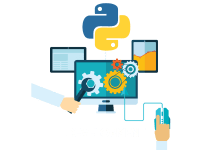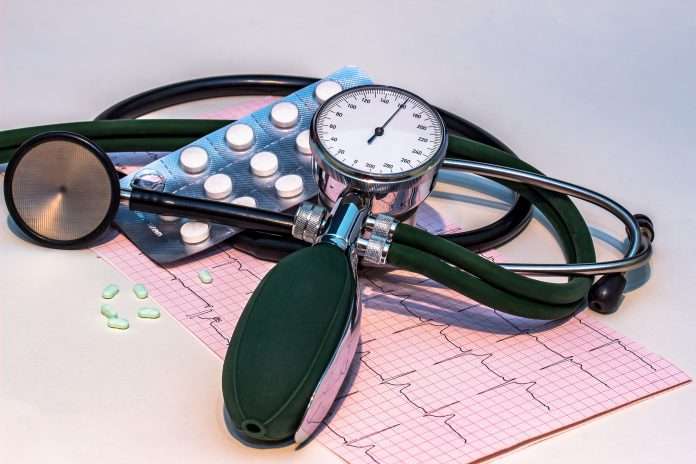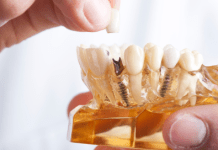High blood pressure, medically known as hypertension, generally occurs when your body’s blood pressure suddenly starts increasing to an unhealthy level. It usually happens when the arteries of your heart get narrowed due to a high cholesterol level and other health issues.
The narrower your arteries become, the less blood they will be able to carry, which would ultimately increase your blood pressure. If you leave this condition untreated, then it can cause several health problems, including heart diseases.
Due to various lifestyle issues, hypertension has become quite common among adults. According to a recent study, nearly 45% of people over the age of 30 are currently coping with this health issue.
However, many of them are still unaware of their condition. It usually happens, because at an early stage, hypertension does not cause any symptoms. Nevertheless, like any other disease, if your doctor can detect this issue at an early stage, then he can help you to control it properly.
Table of Contents
What Causes High Blood Pressure or Hypertension?
Thew doctors generally categorize high blood pressure into two different sections, which are Primary Hypertension and Secondary Hypertension.
Primary Hypertension
Also known as essential hypertension, primary hypertension is a type of chronic condition, which develops over a prolonged period. It is the most common type of hypertension. In most cases, primary hypertension occurs without any viable cause. However, there are a few factors, which can contribute to this issue. Here are some of them.
Age
The overall risk of getting affected by primary hypertension increases as you age. People, especially men, who are over 50 years of age, are at high risk of developing this condition. However, primary hypertension is generally more common in women with an age of over 65.
Obesity
If you weigh more, then your body would need a higher amount of oxygen supply. Due to this reason, the rate of blood circulation through your veins also increases, which increases your blood pressure.
Smoking
Smoking is known to be the most common cause of blood pressure as the chemicals in cigarettes can damage your artery walls severely. Chewing tobacco or smoking, sometimes, also increases your blood pressure temporarily. Apart from that, passive smoking can also increase your risk of primary hypertension.
Stress
Suffering from extreme stress and anxiety can also damage the internal sections of your blood vessels. So, if you do not want to develop hypertension, then try to relieve your stress as much as possible.
Alcohol
Like tobacco, alcohol, too, contains various components, which can critically damage your blood vessels as well as your heart. It is also known to be the most prominent factor what causes high blood pressure.
Genetic factor
Several doctors and physicians also consider primary hypertension to be one of the major genetic health issues. Thus, if high blood pressure runs in your family, then you are more likely to be affected by it than any other person.
Unhealthy Lifestyle
Leading a sedentary lifestyle can promote the cholesterol level of your body, which can affect the arteries of your heart. Due to this reason, most doctors ask their patients to exercise every day for at least thirty minutes.
Secondary Hypertension
Unlike primary hypertension, secondary high blood pressure occurs almost instantly and can cause a lot more severe symptoms than primary hypertension. Here are some health conditions that can promote this condition.
Kidney Diseases
Almost any kind of kidney disease or infection, such as UTI, Glomerulonephritis, Polycystic Kidney Disease, etc. can elevate your blood pressure level.
Side Effects of Medications
Numerous types of anti-depressants and amphetamines can also increase your blood pressure level by increasing the blood circulation rate of your body.
Endocrine Tumors
Endocrine tumors, both cancerous and non-cancerous, can also increase your chances of getting affected by secondary hypertension.
Adrenal Gland Issues
The different types of adrenal gland ailments, such as Addison’s disease, CAH, and Cushing Syndrome, can also increase your blood pressure level.
So, these are some of the factors that can increase your risk of hypertension. However, among these, drinking is known to be the most common factor what causes high blood pressure.
Symptoms of High Blood Pressure or Hypertension
As mentioned before, high blood pressure, especially primary hypertension, is known to be a silent condition. It usually does not show any signs until your blood vessels are severely damaged. Here are some of the symptoms that you might encounter if you are suffering from hypertension.
Headaches
Headaches are one of the most common symptoms of hypertension. It usually occurs if the veins of your brain have been damaged by high blood pressure.
Fatigue
High blood pressure can damage the veins of your heart and weaken it drastically. Therefore, if you have this condition, then you might invariably feel fatigued or tired.
Dizziness
This symptom usually accompanies with headaches. When the pain becomes more severe and unbearable, then you might feel a little bit dizzy. Apart from this, you might also experience visual changes due to the severity of pain.
Blood in Urine
Blood in urine might occur if the pressure of blood has damaged the veins of your kidney or bladder and inflicted an internal hemorrhage. Hemorrhage is known to be an emergency medical condition. Therefore, you need to treat it as soon as possible.
Bleeding from Nose
Aside from bloody urine, you might also experience nosebleeds if the internal hemorrhage has occurred in your cerebrum or nasal area. This symptom usually accompanies severe headaches with it.
Shortness of Breath
It is yet another remarkably common symptom, which frequently occurs among the patients of hypertension, especially when they are running or doing some heavy work. If you are overworking your heart, then, sometimes, you might also experience extreme difficulty while breathing.
Pounding in Ear or Neck
If your blood pressure is very high, then you might also experience a feeling of constant pounding in your ears or neck. It usually occurs before a hypertension headache.
Almost all of these symptoms usually occur when the condition has severely damaged your blood vessels. Therefore, to avoid any complication, make sure to go to your doctor as soon as possible.
How is High Blood Pressure or Hypertension Diagnosed?
As you have already known about what causes high blood pressure, now you need to know about the diagnostic procedures, which can detect it. The following are some of the most prominent ones.
Ultrasound
To search for any internal damage in your organs, such as your kidney or heart, your doctor would ask you to undergo a proper ultrasound procedure.
Cholesterol Screening
There are numerous types of blood tests, which can help the doctor to evaluate the amount of cholesterol in your body.
Urine Test
Through a urine test, the doctor would be able to understand the health condition of your kidney.
Electrocardiogram
To test the condition of your heart, your doctor might also ask you to undergo an echocardiogram (ECG) test.
These tests can help your doctor to understand the exact issue that has been causing your condition. Once he finds out the cause, he will be able to start planning your treatment.
What are the Main Treatment Options for Hypertension?
As you currently know about what causes high blood pressure and its diagnostic procedure, now it is time for you to know about the treatment options. Here is what you need to acknowledge in this aspect.
Drugs and Medications
Hypertension is quite hard to control with only one kind of medication. Most of the time, the patients usually have to take a combination of more than two to three types of drugs to keep their symptoms under control.
Here are some of the medications that are widely used by doctors to treat this medical condition.
Diuretics
Excessive fluid and elevated sodium levels in your body can cause hypertension. So, to treat this issue, you would have to take diuretics. Commonly known as water pills, these drugs can help in removing the extra sodium from your body through frequent urination. Therefore, your blood vessels get more relaxed, which ultimately reduces your blood pressure.
Alpha-2 Agonists
Alpha-2 Agonists help in reducing the pressure or stress from your nervous system. Therefore, your body’s blood vessels also get relaxed and normalize the blood-flowing procedure.
Beta-blockers
Beta-blockers helps in reducing the beating rate and force of your heart. It, on the other hand, helps in lowering the amount of blood flow through your cardiac arteries and lessens your blood pressure. Apart from that, it also assists in blocking numerous hormones, which are responsible for increasing blood pressure.
ARBs
Also known as Angiotensin II Receptor Blockers, the ARBs help in keeping angiotensin away from the receptors. Therefore, your blood vessels do not get tightened that easily and promote proper blood flow.
Calcium Channel Blockers
Unlike ARBs, the CCBs aims to reduce the overall calcium level of your blood vessel, which helps in relaxing the surrounding muscles. Thus, if you take these medicines on a regular basis, then your blood pressure will go down quite promptly.
So, these are some of the most common types of medications, which can aid in reducing the level of your blood pressure.
Lifestyle Changes
Aside from taking medicines, you would also have to change your lifestyle to control hypertension. Here are some ways that can help you with it.
Reduce Drinking
When talking about what causes high blood pressure, alcohol always comes in the first position in the list. Therefore, for the betterment of your condition, you would have to reduce the frequency of drinking. If you currently have hypertension, then make sure not to drink more than one glass of liquor in a week.
Stop Smoking
Smoking regularly can damage the walls of your artery and weaken them. Therefore, if you are an avid smoker, then try to reduce the number of cigarettes that you are smoking every day.
Lower Your Sodium Intake
Having too much sodium in your blood and body can be quite unhealthy for your heart. So, when eating, make sure to avoid sodium-rich foods as much as possible.
Exercise Everyday
If your blood pressure level is increasing because of cholesterol, then you would also have to start exercising every day. It will help you to burn off the extra fats from your body, which would, indirectly, lower your blood pressure level.
Eat More Vegetables
Unlike red meats, vegetables are rich in various vitamins and minerals, which can help to relax your veins and make your heart more vigorous. So, if you want to control your condition, adding vegetables to your daily diet can be a great idea.
Increase Your Sleeping Time
Increasing your sleeping time alone cannot help to control hypertension. But, if you do not get adequate sleep, then your condition might get worse. So, make sure to get at least eight hours of sleep during the nighttime.
Apart from knowing what causes blood pressure, now you also have acknowledged about the methods that can help you to treat it. So, take your time and make a proper plan with all these information to subdue the symptoms of hypertension.
FAQ on High Blood Pressure
1. What causes high blood pressure?
There are numerous factors that can cause high blood pressure or hypertension. However, among them, drinking and smoking are considered to be the most prominent ones.
2. What can be considered high blood pressure?
Hypertension occurs when your blood pressure increases more than the limit of 130/80.
3. Can a high level of stress cause hypertension?
Small periods of stress usually do not cause hypertension. However, if you are suffering from chronic stress issues, then your risk of high blood pressure will surely increase.
4. What Causes Low Blood Pressure?
Unlike hypertension, hypotension is usually caused by hormonal issues, liver diseases, heatstroke, and various other heart issues.
High blood pressure can lead to numerous fatal health conditions, which can ultimately lead to death. So, to stay away from these complications, make sure to lead a healthy life, and follow your doctor’s directions properly.


















